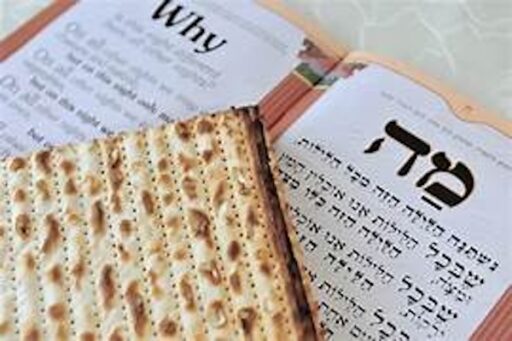“You knew how things open,” Howard Levy writes in “This Web,” the poem that opens Levy’s first book, A Day This Lit.
*
I know how things close.
*
“You knew how things open,
a flower, a jail, an eye
and at the very last, a hand.”
Levy’s poem is written in honor of Aleksander Wat. Born in 1900 into a Jewish family in Poland, Wat was arrested and jailed multiple times—by the Polish government and the Russians—for his political views. He also knew how things close.
*
Passover seder: a ritualistic, symbolic journey from enslavement to freedom.
This year’s first seder: with strangers. Not exactly strangers. Poets. I knew the work of a few of them. One is a dear friend. Two spouses, one of whom is my wife. Sitting down at the diaspora seder table—(diaspora Jews hold two seders; Israeli Jews, one)—I assumed most if not all of the twelve of us were Jews. Strangers? Not exactly.
*
“It is already evening when the hand
opens. The streetlights have come on,
people absorbed into their coats
and scarves hurry along the street.
No one speaks, not many even
look around them, they spare themselves
the torments of community.”
I wasn’t tormented, exactly, in the days leading up to the seder. But I was distressed. Sick with self-doubt about the quality of my work and my fitness to sit at a table among a group of very accomplished, talented poets, it was hard enough for me to attend this seder let alone lead it. Three days before the seder, my friend, who was hosting the seder, asked me to lead it.
If only I were one of those people in Levy’s poem, safely anonymous, hurrying along a Manhattan Street.
Min hameitzar karati Yah; In distress I called on the LORD. (Psalm 118)
*
Hameitzar: In English, “distress.” That’s how it’s translated in the Jewish Publication Society Tanakh and the King James Bible. “Straits”: that’s Robert Alter. Alter’s translation, indeed, is the straightest, the most literal of these translations. “Straits”: a narrow place, a narrow passage.
The word hameitzar shares a root with the word Mitzrayim, the name in Hebrew for Egypt. The Haggadah, the script for the ritual meal, teaches us that every Jew must feel as if he, she, or they were the one freed from Egypt. To experience liberation, we must first direct our attention to places in our lives where we feel if not literally imprisoned then limited, confined, stuck, trapped.
My narrow place: fear of rejection. My therapist says that fear may have entered my life when, as an infant, I was abandoned by my biological father. If only I could remember the sounds of that moment: the voices, the door closing, the car pulling out of the driveway…. But I don’t need rebirthing or age regression therapy to return to that narrow place. Even as I was greeted at the Greenwich Village apartment door of my friend, I was right there, trembling with fear of imminent rejection.
*
Most of us at the table were Jews. But what kind of Jews? Engaged? Assimilated, disaffected, alienated? Religious? Secular? And, at this moment, where were we in relation to Israel? For surely Israel—and Gaza and the West Bank—would be at the seder with us, either spoken or unspoken. I knew where I stood: confused, conflicted. So many others—Jews and non-Jews—seem certain: “ceasefire now,” “finish the job,” “free the hostages,” “free Palestine,” “destroy Hamas”…. What’s Israel to do? What are the Palestinians to do? Not kill each other, for one! That’s all I knew for sure.
*
Min hameitzar karati Yah, anani b’merchav Yah; In distress I called on the LORD; the Lord answered me and brought me relief.
That’s the complete verse from Psalm 118.
*
B’merchav: “a wide open place” in Alter’s translation. Read in the context of Passover: the desert. For the Hebrews freed from Egypt, an unfamiliar, uncomfortable place: where are the cucumbers, melons, leeks, onions, and garlic we ate freely in Egypt, they complain. At this year’s seder table, in a city where I’ve never celebrated Passover before, among people I did not know, I was in an unfamiliar place. Unfamiliar doesn’t necessarily mean uncomfortable. But I was uncomfortable.
*
Levy’s poem continues:
“In a small restaurant off the Central Square,
the first diners of the evening have entered.
A waiter who only this morning dreamed
of the exhaustion of his charity rises.
As he stands over them, you write—
their hands poised to eat, his poised
to serve, the cook’s to cook—”
*
We were gathered in a beautiful apartment full of books, art, and food: brisket! poached salmon! and more, much more. Enough to feed twenty!
*
We started the seder by chanting Min hameitzar karati Yah, anani b’merchav Yah. Even as I led the chant, I didn’t know: do they like chanting? Do they like chanting in Hebrew? Then we shared: personal experiences of being stuck. We heard intimate, heartbreaking and uplifting stories. We heard anger, sadness, guilt over suffering in Israel and Gaza. And we heard about love and gratitude for family and friends. Situations and moments in our lives in which we feel connected, expansive, spacious, whole.
That’s it, I joked, when we concluded our sharing. We just traveled from Egypt to wide-open spaces. We’ve completed the seder. In actuality, we hadn’t even taken the first of fifteen traditional steps of the seder, blessing and drinking the first of four cups of wine.
*
Humans are human. Even in a wide open place, the Sinai desert, we might still feel constricted, stuck in our conditioning. But this desert is also the place of miracles—manna, a double portion for Shabbat, the Sabbath, and the revelation, a direct experience of the Divine. It takes work, maybe forty years, maybe even a lifetime, to make the passage from enslavement, whether to inner or external conditions, to freedom. In some circumstances, it takes many lifetimes.
*
“This Web” concludes,
“this intimate whisper of revelation:
this web of hands.”
There in a “small restaurant off the Central Square”: the hands of strangers, a diner, a server, a cook, forming a necessary web on which life depends. Here in this small Greenwich Village apartment…
*
Levy’s poem has nothing to do with Passover. Yet it helps me see more clearly what I experienced at the seder. I arrived at the seder feeling alone. Alone and afraid. I left feeling relieved, yes. But I also felt less alone. I had spent an evening with some smart, kind, generous, honest people, a few of whom I’m now becoming friends with. Howard Levy among them.
*
The day I returned to Asheville, I ordered Levy’s book. When it arrived, as I walked from the mailbox back to the house I read the first poem. I was alone where no one could judge me—my intelligence as a reader, my taste. And I wasn’t alone. Levy’s hand—his voice, his craft—opened and gave me the world, the world without and within. With his poems in my hand—in my ears, my heart—I was free, I was home.
Richard Chess has published four books of poetry, the most recent of which is Love Nailed to the Doorpost. Professor emeritus from UNC Asheville, where he directed the Center for Jewish Studies for 30 years, Chess serves on the boards of Yetzirah: A Hearth for Jewish Poetry and Black Mountain College Museum + Arts Center, where he co-directs its Faith in Arts project. You can find him at www.richardchess.com .





